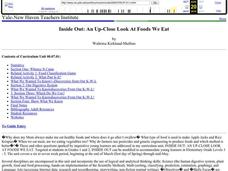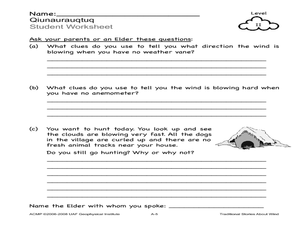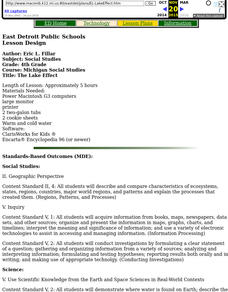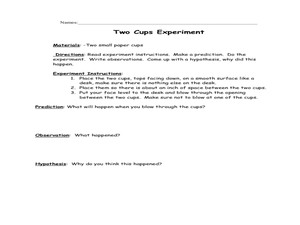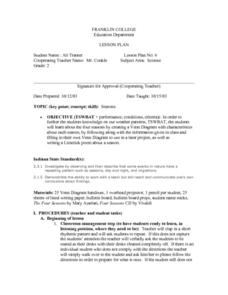Curated OER
The Mechanisms of Decay and Decomposition
Eighth graders study how all living things die. They are introduced tot he life cycle and the concept of an ecosystem. Students have a introductory exposure to trophic levels (producer-consumer-decomposer) in the environment.
Curated OER
Solids, Liquids, and Gases
Students explore the three main forms of matter: solid, liquid, and gas. They examine concrete examples of each, using their five senses and "experimenting" to find differences in them. They find pictures of each, cut them out and past...
Curated OER
Extreme Acceleration
Students explore the concept of acceleration. They determine the acceleration rate of a roller-blader and graph the results.
Curated OER
Investigating the Probability
Students investigate probability using coins and dice. They collect data, graph, organize and interpret data. They predict, describe, compare, compute and draw conclusions based on what they observe and record.
Curated OER
Kinetic Theory
Students describe how molecules of the different phases of matter move according to the Kinetic Theory. In this chemistry instructional activity, students observe and participate in teacher demos. They give real world applications of the...
Curated OER
Electricity and Magnetism: Are They Related?
Students explore electricity and magnetism. Through the use of role play, students simulate being a scientist. Experiments are performed during the simulation to discover the relationship between electric current and magnetism. After...
Curated OER
Build Your Own Atom
Students build a model of an atom using an online program. In this chemistry lesson, students discuss the different parts of the atom. They complete an independent research about their chosen element.
Curated OER
How Do Cells Reproduce?
Students discuss the importance of reproduction of cells. They identify and describe the stages of Mitosis. They discover what happens to chromosomes and DNA during reproduction.
Curated OER
Inside Out: An Up-Close Look At Foods We Eat
Fourth graders identify the origins of meats and vegetables consumed by humans on a daily basis. They classify foods (meats, dairy products, grains...) and create a food pyramid.
Curated OER
Photosynthesis
Seventh graders investigate a multidisciplinary unit with an emphasis in using technology in order to engage them. The students perform Internet research about photosynthesis with a written assessment taken from the WebQuest.
Curated OER
Traditional Stories about Wind
Young scholars observe and talk about wind using no weather instruments. In this wind lesson plan, students use their senses to observe wind. They also interview an Elder about wind.
Curated OER
The Lake Effect
Fourth graders conduct an experiment demonstrating the effects of water and air temperature on precipitation. They create graphs demonstrating their findings using Claris Works for Kids.
Curated OER
Using Chromatography to Identify Unknowns
Learners are introduced to the concept of chromatography. They practice using new vocabular and observing experiments. They answer discussion questions to end the lesson plan.
Curated OER
Magnetic Force
Learners are introduced to the attraction and repulsion of magnetic forces. In groups, they observe how the forces react with different materials and record their data. They develop their own conclusions about the poles of magnets and...
Curated OER
Magnets
Learners investigate the magnetic attraction of different materials by observing a demonstration, and review the words "attraction" and "materials." Next they conduct exploration of a number of materials which have different properties...
Curated OER
Understanding Bernoulli's Principle
Fifth graders explain why we fly. In this space science activity, 5th graders discuss Bernoulli's prinicple and its relation to flight.
Curated OER
Microarrays: Chipping Away at the Mysteries of Science and Medicine
High schoolers research microarrays on the internet in cooperative groups. Students write an essay describing the use of microarrays in environmental research and in medicine.
Curated OER
Weather Patterns
Fourth graders collect and chart weather data over the course of the school year either using tools at school or media resources. They agree on weather terms to use in their observations and write them on the assigned sheet. Finally,...
Curated OER
Observing Rocks
Fifth graders explore the various properties of earth and rocks. They play "Twenty Questions" with the teacher, and analyze a rock using a magnifying glass. They record their rock observations and list the differences between the wet...
Curated OER
Ecology and Ecosystem
Students are introduced to the concepts of ecology and ecosystems. In groups, they use the Internet to research one of six topics. They present their information to the class sharing the most interesting information they found. They...
Curated OER
Pitch
Students experience sounds with different pitches. In this pitch activity, students use open pipes as they are introduced to pitch, then make Straw Pan Pipes.
Curated OER
Animal Adaptations: Focus on Bird Beaks
Sixth graders explore bird beaks as animal adaptation. In this bird adaptation lesson, 6th graders conduct an experiment to determine the connection between the shape of a bird's beak and the food it eats.
Curated OER
Model Mania
Eighth graders study the conservation of matter. For this chemical reaction lesson students examine what happens during a chemical reaction and complete a lab activity.
Curated OER
Using the Very, Very Simple Climate Model in the Classroom
Students study the relationship between the average global temperature and carbon dioxide emissions. In this weather lesson students develop a test scenario using a model then read and interpret graphs of data.










